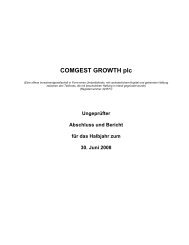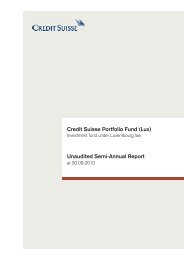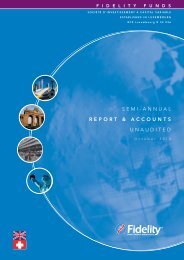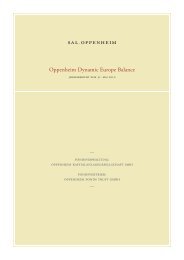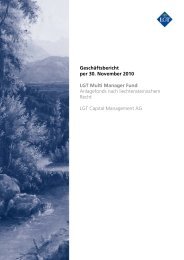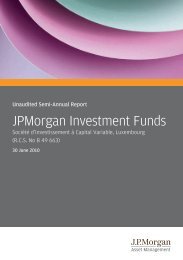Verkaufsprospekt
Verkaufsprospekt
Verkaufsprospekt
Erfolgreiche ePaper selbst erstellen
Machen Sie aus Ihren PDF Publikationen ein blätterbares Flipbook mit unserer einzigartigen Google optimierten e-Paper Software.
Investment grade securities may be subject to the risk of<br />
being downgraded to a rating that is below investment<br />
grade.<br />
Unitholders should note that where investment grade securities<br />
are downgraded to a rating that is below investment<br />
grade after acquisition, there is no specific requirement to<br />
sell such securities unless otherwise stated in the investment<br />
policy outlined above in this Supplement. In the event<br />
of such downgrading, the Manager or its delegates will<br />
promptly analyse such securities and the financials of the<br />
issuer of such securities to determine the action to be<br />
taken (i.e. hold, reduce or buy).<br />
Many fixed income securities especially those issued at<br />
high interest rates provide that the issuer may repay them<br />
early. Issuers often exercise this right when interest rates<br />
decline. Accordingly, holders of securities that are pre-paid<br />
may not benefit fully from the increase in value that other<br />
fixed income securities experience when rates decline.<br />
Furthermore, in such a scenario the Sub-Fund may reinvest<br />
the proceeds of the pay-off at the then current<br />
yields, which will be lower than those paid by the security<br />
that was paid off. Pre-payments may cause losses on<br />
securities purchased at a premium, and unscheduled prepayments,<br />
which will be made at par, will cause the Sub-<br />
Fund to experience loss equal to any unamortized premium.<br />
An investment in sovereign debt securities, including, but<br />
not limited to, those issued by sovereign / government<br />
bodies of countries in the Eurozone, may be subject to<br />
credit and / or default risks. Particularly high (or increasing)<br />
levels of government fiscal deficit and / or high levels of<br />
government debts, amongst other factors, may adversely<br />
affect the credit rating of such sovereign debt securities<br />
and may lead to market concerns of higher default risk. In<br />
the unlikely event of downgrading or default, the value of<br />
such securities may be adversely affected resulting in the<br />
loss of some or all of the sums invested in such securities.<br />
Below Investment Grade Debt Securities: An investment<br />
in high yield securities, or below investment grade<br />
debt securities, meaning securities rated below Baa3 by<br />
Moody’s or below BBB- by Standard and Poor’s, sometimes<br />
referred to as “junk bonds”, or low credit quality<br />
securities, involves a higher degree of risk than investment<br />
in investment grade debt securities. Issuers of these securities<br />
are often highly leveraged, so that their ability to<br />
service debt obligations during an economic downturn may<br />
be impaired. The lower ratings of securities reflect a<br />
greater possibility of adverse changes in the financial condition<br />
of the issuer, which may impair the ability of the<br />
issuer to make payments of interest and principal. The risk<br />
of loss due to default in payment of interest or principal by<br />
such issuers is significantly greater than in the case of<br />
investment grade securities because such securities frequently<br />
are subordinated to the prior payment of senior<br />
indebtedness. In the case of default or winding up of an<br />
issuer of below investment grade securities, there is a<br />
greater risk that the capital / assets of the issuer will be<br />
insufficient to meet all of its liabilities and the holders of<br />
below investment grade securities, (who rank as unsecured<br />
creditors) could in such circumstances lose their<br />
entire investment. An economic downturn or a period of<br />
PineBridge Global Emerging Markets Local Currency Bond Fund<br />
rising interest rates could adversely affect the market for<br />
these securities and reduce the Sub-Fund’s ability to sell<br />
these securities.<br />
The market for below investment grade rated securities<br />
may be thinner and less active than that for higher quality<br />
securities which can adversely affect the price at which<br />
securities can be sold. To the extent that there is no regular<br />
secondary market trading for certain lower rated securities,<br />
the investment manager may experience difficulty in<br />
valuing such securities and in turn the Sub-Fund’s assets.<br />
Credit Default Swaps: When the Sub-Fund is the buyer of<br />
a credit default swap, it would be entitled to receive the<br />
agreed-upon value (or par) of a referenced debt obligation<br />
from the counterparty to the swap on the occurrence of<br />
certain credit events in relation to the relevant reference<br />
entity. As consideration, the Sub-Fund would pay to the<br />
counterparty a periodic stream of fixed payments during<br />
the life of the swap if no credit event has occurred, in<br />
which case the Sub-Fund would receive no benefits under<br />
the swap. In circumstances in which the Sub-Fund does<br />
not own the debt securities that are deliverable under a<br />
credit default swap, the Sub-Fund is exposed to the risk<br />
that deliverable securities will not be available in the market,<br />
or will be available only at unfavourable prices. In<br />
certain instances of issuer defaults or restructurings, it has<br />
been unclear under the standard industry documentation<br />
for credit default swaps whether or not a "credit event"<br />
triggering the seller's payment obligation had occurred. In<br />
either of these cases, the Sub-Fund would not be able to<br />
realize the full value of the credit default swap upon a<br />
default by the reference entity. As a seller of credit default<br />
swaps, the Sub-Fund incurs exposure to the credit of the<br />
reference entity and is subject to many of the same risks it<br />
would incur if it were holding debt securities issued by the<br />
reference entity. However, the Sub-Fund will not have any<br />
legal recourse against the reference entity and will not<br />
benefit from any collateral securing the reference entity's<br />
debt obligations.<br />
Political and Economic Risk: Russia: There are significant<br />
risks inherent in investing in Russia. There is no history<br />
of stability in the Russian market and no guarantee of<br />
future stability. The economic infrastructure of Russia is<br />
poor and the country maintains a high level of external and<br />
internal debt. Tax regulations are ambiguous and unclear<br />
and there is a risk of imposition of arbitrary or onerous<br />
taxes. Banks and other financial systems are not well<br />
developed or regulated and as a result tend to be untested<br />
and have low credit ratings. Bankruptcy and insolvency are<br />
a commonplace feature of the business environment.<br />
Foreign investment is affected by restrictions in terms of<br />
repatriation and convertibility of currency. Regulations<br />
governing securities investment may not exist or may be<br />
applied in an arbitrary and inconsistent manner. Foreign<br />
investors cannot be guaranteed redress in a court of law<br />
for breach of local laws, regulations or contracts.<br />
Volatility Risk: All markets are subject to volatility based<br />
on prevailing economic conditions. Securities in 'emerging'<br />
or 'developing' markets may involve a higher degree of risk<br />
due to the small current size of the markets for securities<br />
of 'emerging' or 'developing' market issuers and the currently<br />
low or non-existent volume of trading, which could<br />
| 92


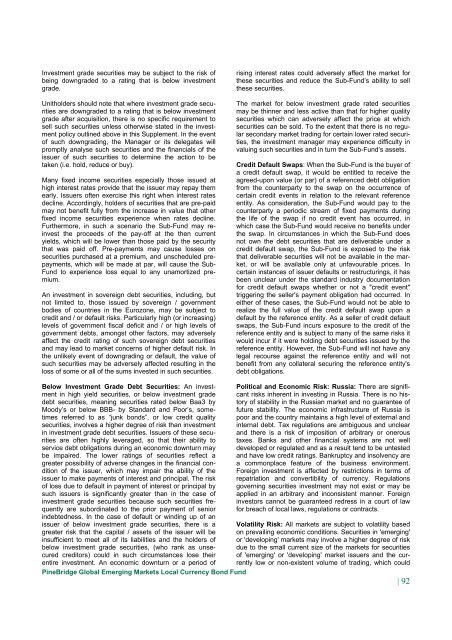
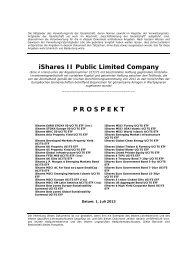
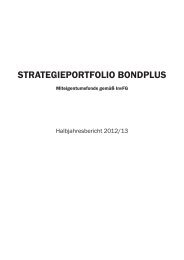
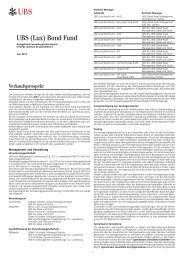
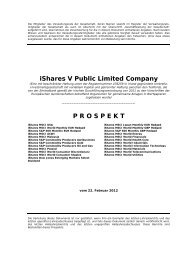
![Prospectus Simplifié daté de [Mars] 2005](https://img.yumpu.com/18875582/1/190x245/prospectus-simplifie-date-de-mars-2005.jpg?quality=85)
